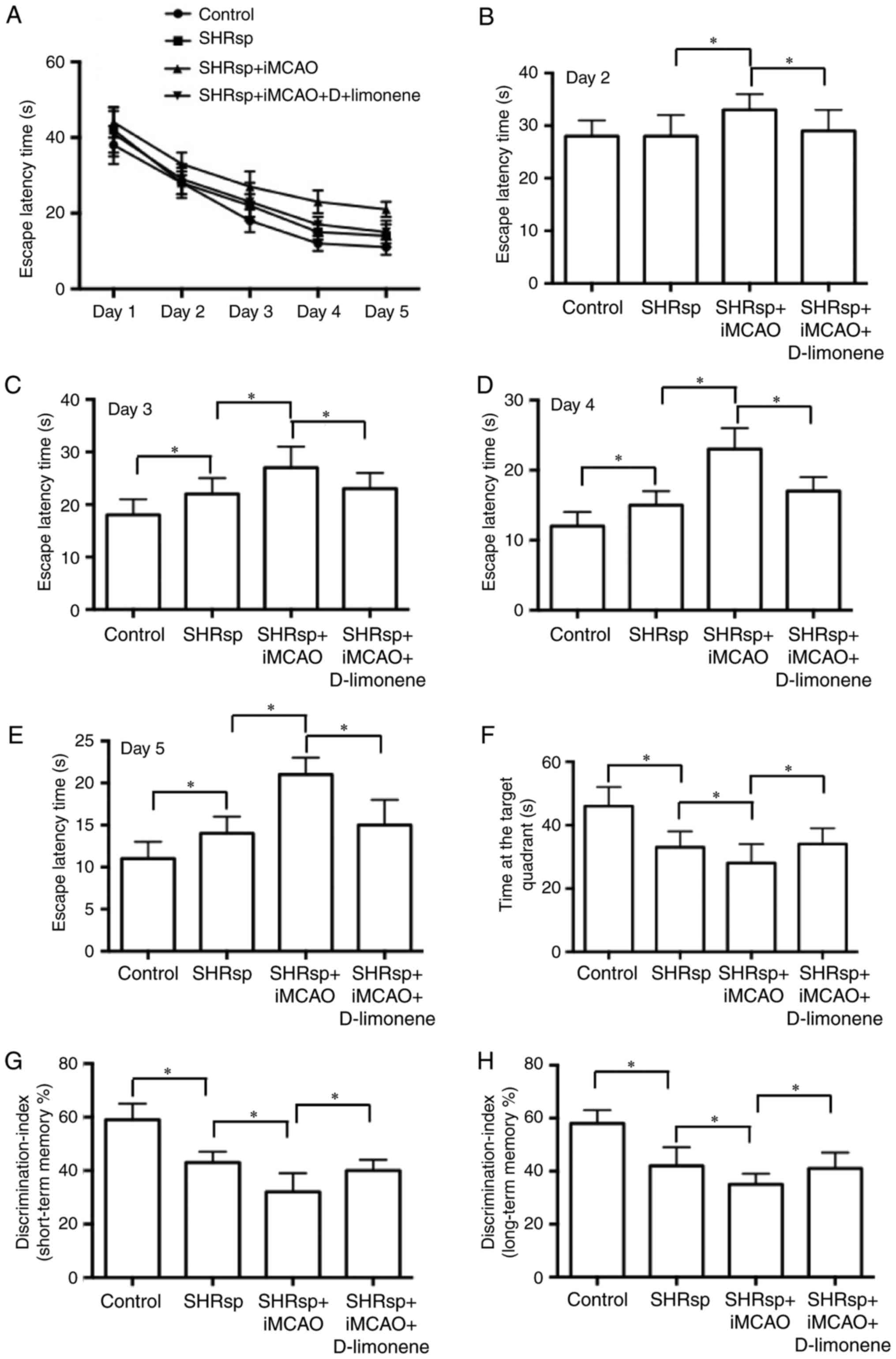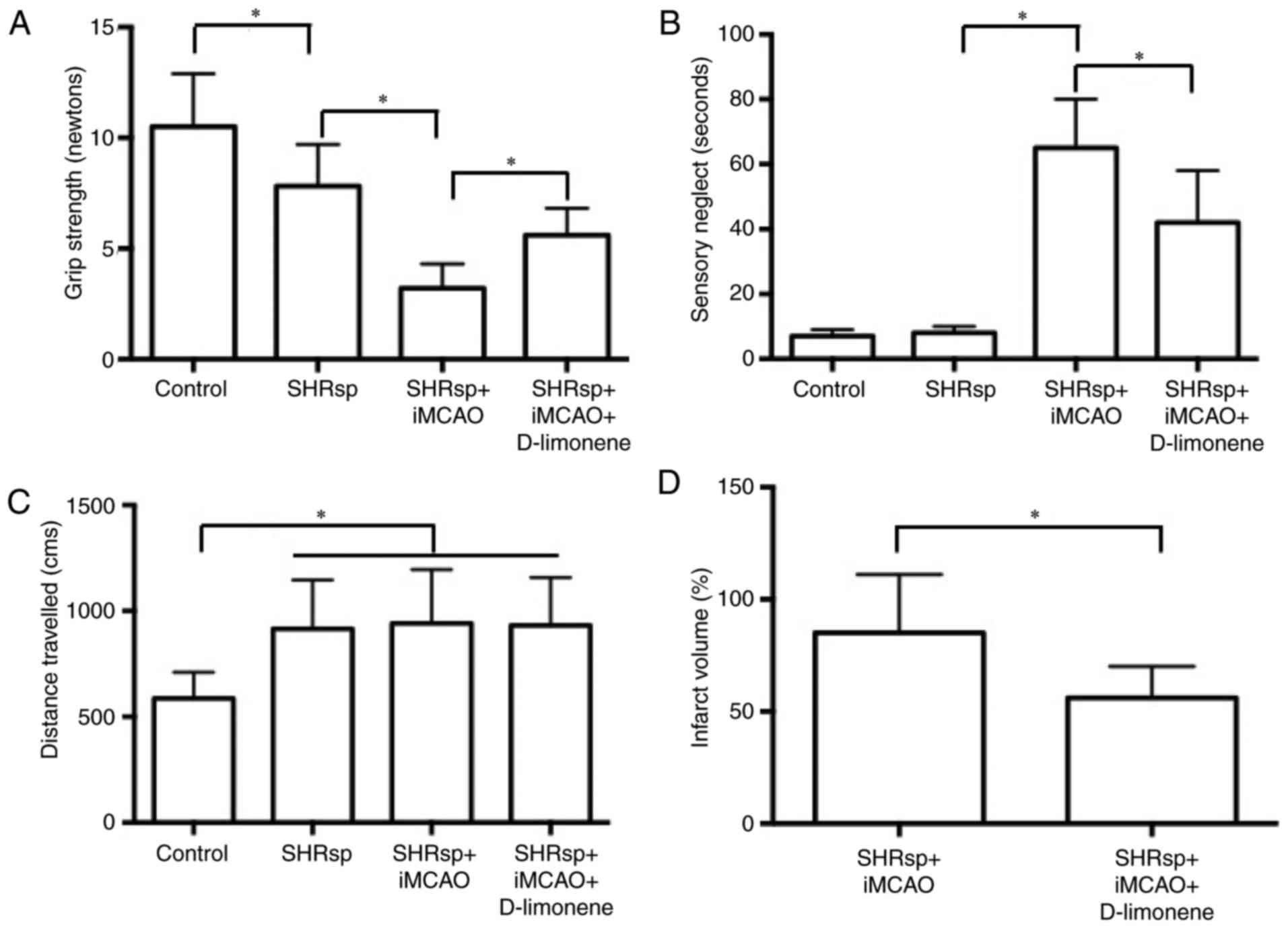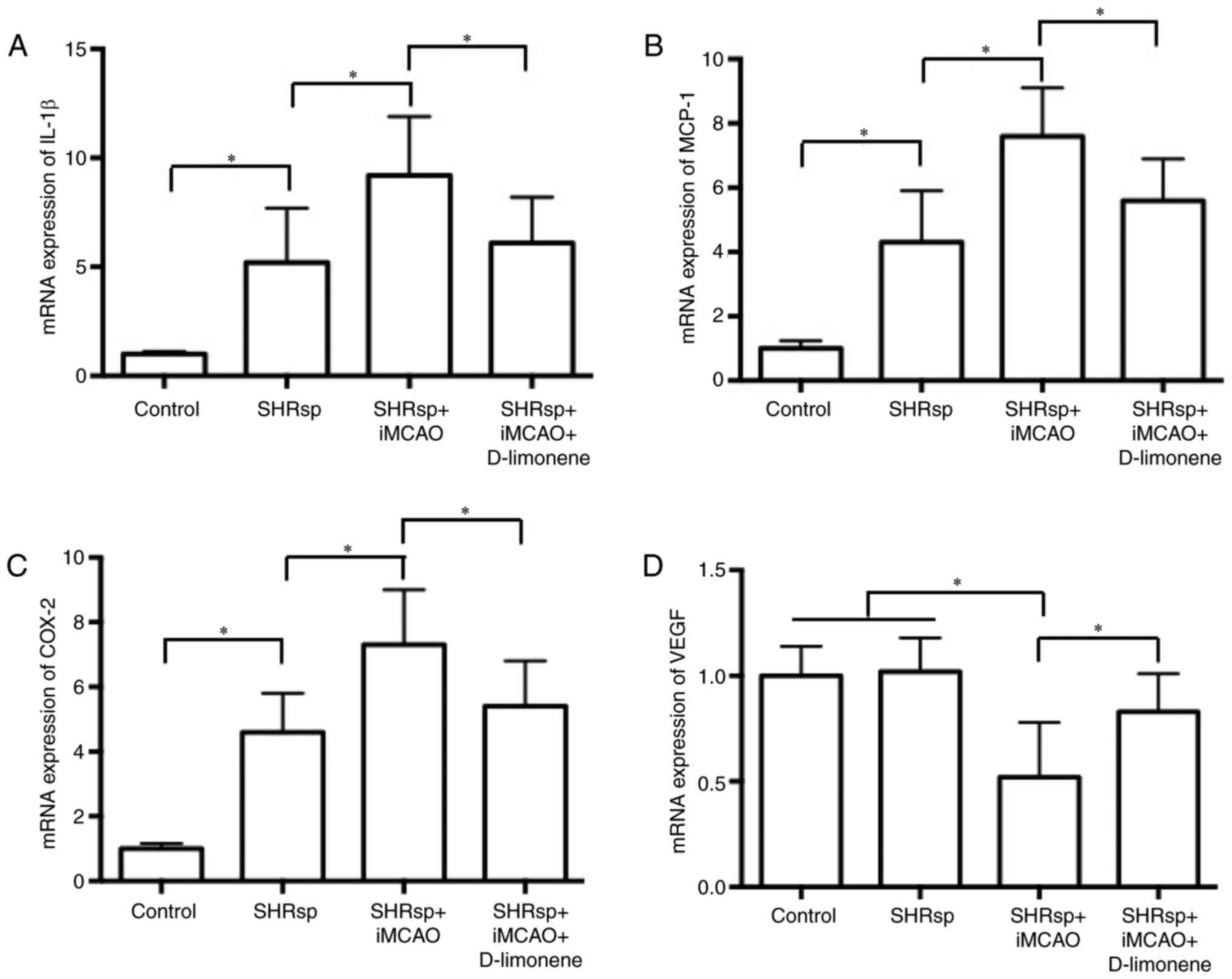|
1
|
Pantoni L: Cerebral small vessel disease:
From pathogenesis and clinical characteristics to therapeutic
challenges. Lancet Neurol. 9:689–701. 2010. View Article : Google Scholar : PubMed/NCBI
|
|
2
|
Debette S and Markus HS: The clinical
importance of white matter hyperintensities on brain magnetic
resonance imaging: Systematic review and meta-analysis. BMJ.
341:c36662010. View Article : Google Scholar : PubMed/NCBI
|
|
3
|
Madigan JB, Wilcock DM and Hainsworth AH:
Vascular contributions to cognitive impairment and dementia:
Topical review of animal models. Stroke. 47:1953–1959. 2016.
View Article : Google Scholar : PubMed/NCBI
|
|
4
|
Jokinen H, Kalska H, Ylikoski R, Madureira
S, Verdelho A, van der Flier WM, Scheltens P, Barkhof F, Visser MC,
Fazekas F, et al: Longitudinal cognitive decline in subcortical
ischemic vascular disease-the LADIS Study. Cerebrovasc Dis.
27:384–391. 2009. View Article : Google Scholar : PubMed/NCBI
|
|
5
|
Gouw AA, van der Flier WM, Pantoni L,
Inzitari D, Erkinjuntti T, Wahlund LO, Waldemar G, Schmidt R,
Fazekas F, Scheltens P, et al: On the etiology of incident brain
lacunes: Longitudinal observations from the LADIS study. Stroke.
39:3083–3085. 2008. View Article : Google Scholar : PubMed/NCBI
|
|
6
|
Centers for Disease Control and Prevention
(CDC), . Prevalence of stroke-United States, 2006–2010. MMWR Morb
Mortal Wkly Rep. 61:379–82. 2012.PubMed/NCBI
|
|
7
|
Yamori Y: Importance of genetic factors in
stroke: An evidence obtained by selective breeding of stroke-prone
and -resistant SHR. Jpn Circ J. 38:1095–1000. 1974. View Article : Google Scholar : PubMed/NCBI
|
|
8
|
Rubattu S, Lee-Kirsch MA, DePaolis P,
Giliberti R, Gigante B, Lombardi A, Volpe M and Lindpaintner K:
Altered structure, regulation, and function of the gene encoding
the atrial natriuretic peptide in the stroke-prone spontaneously
hypertensive rat. Circ Res. 85:900–905. 1999. View Article : Google Scholar : PubMed/NCBI
|
|
9
|
Yamagata K, Kitazawa T, Shinoda M, Tagawa
C, Chino M and Matsufuji H: Stroke status evoked adhesion molecule
genetic alterations in astrocytes isolated from stroke-prone
spontaneously hypertensive rats and the apigenin inhibition of
their expression. Stroke Res Treat. 2010:pii: 3863892010.
|
|
10
|
Tagami M, Ikeda K, Yamagata K, Nara Y,
Fujino H, Kubota A, Numano F and Yamori Y: Vitamin E prevents
apoptosis in hippocampal neurons caused by cerebral ischemia and
reperfusion in stroke-prone spontaneously hypertensive rats. Lab
Invest. 79:609–615. 1999.PubMed/NCBI
|
|
11
|
Mărgăritescu O, Pirici D and Mărgăritescu
C: VEGF expression in human brain tissue after acute ischemic
stroke. Rom J Morphol Embryol. 52:1283–1292. 2011.PubMed/NCBI
|
|
12
|
Banthorpe DV, Charlwood BV and Francis MJ:
The biosynthesis of monoterpenes. Chem Rev. 72:115–155. 1972.
View Article : Google Scholar : PubMed/NCBI
|
|
13
|
Wattenberg LW: Inhibition of
carcinogenesis by minor anutrient constituents of the diet. Proc
Nutr Soc. 49:pp. 173–183. 1990; View Article : Google Scholar : PubMed/NCBI
|
|
14
|
Marshall JR: Improving Americans'
diet-setting public policy with limited knowledge. Am J Public
Health. 85:1609–1611. 1995. View Article : Google Scholar : PubMed/NCBI
|
|
15
|
National Toxicology Program, . NTP
Toxicology and Carcinogenesis Studies of d-Limonene (CAS No.
5989-27-5) in F344/N Rats and B6C3F1 Mice (Gavage Studies). Natl
Toxicol Program Tech Rep Ser. 347:1–165. 1990.PubMed/NCBI
|
|
16
|
Chaudhary SC, Siddiqui MS, Athar M and
Alam MS: D-Limonene modulates inflammation, oxidative stress and
Ras-ERK pathway to inhibit murine skin tumorigenesis. Hum Exp
Toxicol. 31:798–811. 2012. View Article : Google Scholar : PubMed/NCBI
|
|
17
|
Tounsi MS, Wannes WA, Ouerghemmi I, Jegham
S, Ben Njima Y, Hamdaoui G, Zemni H and Marzouk B: Juice components
and antioxidant capacity of four Tunisian Citrus varieties. J Sci
Food Agric. 91:142–151. 2011. View Article : Google Scholar : PubMed/NCBI
|
|
18
|
Roberto D, Micucci P, Sebastian T,
Graciela F and Anesini C: Antioxidant activity of limonene on
normal murine lymphocytes: Relation to H2O2 modulation and cell
proliferation. Basic Clin Pharmacol Toxicol. 106:38–44.
2010.PubMed/NCBI
|
|
19
|
Lu XG, Zhan LB, Feng BA, Qu MY, Yu LH and
Xie JH: Inhibition of growth and metastasis of human gastric cancer
implanted in nude mice by d-limonene. World J Gastroenterol.
10:2140–2144. 2004. View Article : Google Scholar : PubMed/NCBI
|
|
20
|
Manuele MG, Barreiro Arcos ML, Davicino R,
Ferraro G, Cremaschi G and Anesini C: Limonene exerts
antiproliferative effects and increases nitric oxide levels on a
lymphoma cell line by dual mechanism of the ERK pathway:
Relationship with oxidative stress. Cancer Invest. 28:135–145.
2010. View Article : Google Scholar : PubMed/NCBI
|
|
21
|
Bodake HB, Panicker KN, Kailaje VV and Rao
KV: Chemopreventive effect of orange oil on the development of
hepatic preneoplastic lesions induced by N-nitrosodiethylamine in
rats: An ultrastructural study. Indian J Exp Biol. 40:245–251.
2002.PubMed/NCBI
|
|
22
|
Del T, oro-Arreola S, Flores-Torales E,
Torres-Lozano C, Del Toro-Arreola A, Tostado-Pelayo K, Guadalupe
Ramirez-Dueñas M and Daneri-Navarro A: Effect of D-limonene on
immune response in BALB/c mice with lymphoma. Int Immunopharmacol.
5:829–838. 2005. View Article : Google Scholar : PubMed/NCBI
|
|
23
|
Shibata H, Fujiwara R, Iwamoto M, Matsuoka
H and Yokoyama MM: Immunological and behavioral effects of
fragrance in mice. Int J Neurosci. 57:151–159. 1991. View Article : Google Scholar : PubMed/NCBI
|
|
24
|
Kawakami K, Kawamoto M, Nomura M, Otani H,
Nabika T and Gonda T: Effects of phytoncides on blood pressure
under restraint stress in SHRS. Clin Exp Pharmacol Physiol. 31
Suppl 2:S27–S28. 2004. View Article : Google Scholar : PubMed/NCBI
|
|
25
|
Rehman MU, Tahir M, Khan AQ, Khan R,
Oday-O-Hamiza, Lateef A, Hassan SK, Rashid S, Ali N, Zeeshan M and
Sultana S: D-limonene suppresses doxorubicin-induced oxidative
stress and inflammation via repression of COX-2, iNOS, and NFκB in
kidneys of Wistar rats. Exp Biol Med (Maywood). 239:465–476. 2014.
View Article : Google Scholar : PubMed/NCBI
|
|
26
|
Victor Antony, Santiago J, Jayachitra J,
Shenbagam M and Nalini N: Dietary d-limonene alleviates insulin
resistance and oxidative stress-induced liver injury in high-fat
diet and L-NAME-treated rats. Eur J Nutr. 51:57–68. 2012.
View Article : Google Scholar : PubMed/NCBI
|
|
27
|
Longa EZ, Weinstein PR, Carlson S and
Cummins R: Reversible middle cerebral artery occlusion without
craniectomy in rats. Stroke. 20:84–91. 1989. View Article : Google Scholar : PubMed/NCBI
|
|
28
|
Yousuf S, Atif F, Sayeed I, Wang J and
Stein DG: Neuroprotection by progesterone after transient cerebral
ischemia in stroke-prone spontaneously hypertensive rats. Horm
Behav. 84:29–40. 2016. View Article : Google Scholar : PubMed/NCBI
|
|
29
|
Yousuf S, Sayeed I, Atif F, Tang H, Wang J
and Stein DG: Delayed progesterone treatment reduces brain
infarction and improves functional outcomes after ischemic stroke:
A time-window study in middle-aged rats. J Cereb Blood Flow Metab.
34:297–306. 2014. View Article : Google Scholar : PubMed/NCBI
|
|
30
|
Touvay C, Vilain B, Carré C, Mencia-Huerta
JM and Braquet P: Effect of limonene and sobrerol on
monocrotaline-induced lung alterations and pulmonary hypertension.
Int Arch Allergy Immunol. 107:272–274. 1995. View Article : Google Scholar : PubMed/NCBI
|
|
31
|
Yun J: Limonene inhibits
methamphetamine-induced locomotor activity via regulation of 5-HT
neuronal function and dopamine release. Phytomedicine. 21:883–887.
2014. View Article : Google Scholar : PubMed/NCBI
|
|
32
|
Li Z, Wang B, Kan Z, Zhang B, Yang Z, Chen
J, Wang D, Wei H, Zhang JN and Jiang R: Progesterone increases
circulating endothelial progenitor cells and induces neural
regeneration after traumatic brain injury in aged rats. J
Neurotrauma. 29:343–353. 2012. View Article : Google Scholar : PubMed/NCBI
|
|
33
|
Liu J, Wang Y, Akamatsu Y, Lee CC, Stetler
RA, Lawton MT and Yang GY: Vascular remodeling after ischemic
stroke: Mechanisms and therapeutic potentials. Prog Neurobiol.
115:138–156. 2014. View Article : Google Scholar : PubMed/NCBI
|
|
34
|
Lankhorst S, Saleh L, Danser AJ and van
den Meiracker AH: Etiology of angiogenesis inhibition-related
hypertension. Curr Opin Pharmacol. 21:7–13. 2015. View Article : Google Scholar : PubMed/NCBI
|
|
35
|
Iadecola C and Davisson RL: Hypertension
and cerebrovascular dysfunction. Cell Metab. 7:476–484. 2008.
View Article : Google Scholar : PubMed/NCBI
|



















